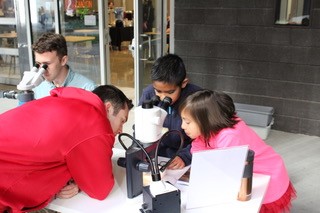Hundreds of undergraduates gathered to present their work at the Annual Undergraduate Biology Research Program Conference on Saturday, Jan. 21. Posters lined the rooms of the second floor of the Environment and Natural Resources 2 building, which flowed with the knowledge of bright minds working in their preferred fields.
The program pairs an undergraduate with a respective mentor of the program, typically in the same field as the students. UBRP allows students to learn and research what they’re passionate about.
“UBRP is an opportunity [for students] to apprentice an expert in their field and to be able to do science and actually do it hands on, be curious and formulate a question, and I think it’s a really good skill for anyone in the future,” said Jennifer Cubeta, a UBRP assistant director.
While being a great way to get real world experience, the program also helps alleviate students’ financial burden by being a paid program.
RELATED: Four ways for undergrads to get involved in science research
“I think it means a lot to students,” Cubeta said. “From what I’ve heard from my own students, many of them just appreciate the opportunity to learn real-world science and get the opportunity to get paid for doing it as well, so it can help offset their cost for college.”
Students said the encouragement from faculty and professors is the most rewarding.
“It seems like the faculty members and the people who are running UBRP are really interested in student development in terms of making sure that you’re not just another set of hands to just do stuff at the lab and that you’re actually getting something out of it,” said Payton De La Cruz, a molecular and cellular biology junior.
Keynote speaker Retsina Meyer launched the conference with a speech on the formula to success. In her formula, Meyer said students shouldn’t consider their failures as mere failures, but rather as learning experiences.
“I think that sometimes we get so concerned with what we’re doing that we sometimes forget about how we’re doing it,” Meyer said. “Keep in mind that process matters too and to be mindful of your values as you pursue your goals and your needs as an individual.”

The conference attracted many UA community members who didn’t participate, but were eager to see and learn about the new information students presented. The student participants presented their work in ways that ordinary individuals could easily comprehend.
“We have some friends here who are presenting so we have just been making the rounds and seeing what kind of cool stuff students have been doing,” De La Cruz said.
Students presented their research on topics ranging from new developments in medical treatments to new ways to classify data.
“The conference is just amazing every year and I think it gets even better, we have more presenters this year than we ever had before and the students are truly amazing,” said Carol Bender, director of the UBRP. “I’m always in awe of what they accomplished.”

Neuroscience and cognitive science major, Kelly Edwards, presented research on how those who have lost their ability to express and understand speech respond to certain types of treatment.
Edwards works with progressive aphasia, the logopenic and semantic varieties in particular, which cause individuals to be unable to think of the word of an item.
Over the summer, Edwards worked with people with aphasia, preforming the Boston Naming Test in which patients name an object presented in a picture.
“I noticed after treatment they were able to give me a lot of information about the object, even though they couldn’t tell me what the name of the object was,” Edwards said.
RELATED: OSIRIS-REx to search for Trojan Asteroids
Edwards said this was a big deal because the patients’ score didn’t reflect that they could communicate better than before treatment, so she created a more meaningful information score that better quantified their improvement.
Megan Hayes, who studies neuroscience and cognitive science as well as molecular and cellular biology, presented research on developing a model of mice with mixed dementia. She hopes her model can be used to help further research in diseases such as Alzheimer’s and dementia.
Before undergraduates presented their research, UBRP dedicated its first hour to refreshments and hands on activities for the children.
There were tables for kids and adults, such as a maritime ecosystem table full of shark specimens, a brain table where kids could test their blind spot and sensory skills and an insect zoo complete with tarantulas and scorpions to be held by the bravest of hearts.
Follow David Pujol on Twitter.














